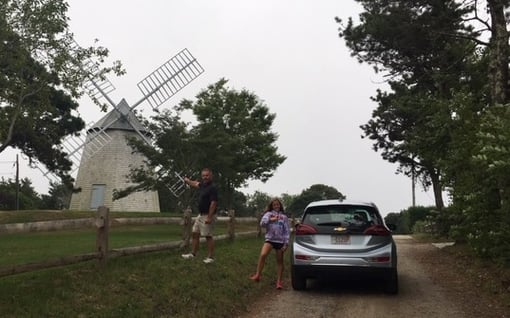Carbon impacts of flying got you down?
For a couple decades now, we've offered consumers an easy way to have their electricity usage met by renewable...

This week, I’m headed to a conference in the Big Apple to talk about how we need to electrify transportation and heating. I looked at my options for getting there. Flying was the quickest, but emitted the most. And inspired in large part by 16-year old climate activist, Greta Thunberg, I couldn’t choose a plane. I thought about taking my wind powered Chevy Bolt, but I didn’t want to drive through the city and Brooklyn doesn’t need another car. So I will be on Amtrak. Maybe I’ll get some work done while riding. There’s a good chance I will nap.
 My wind powered Chevy Bolt.
My wind powered Chevy Bolt.
The point is that we need to take public transportation whenever possible and fly as little as possible. And as I’ll say at the conference, if we’re going to drive a car, it needs to be electric. Buses should be electric too. And, as quickly as possible, we need to stop burning stuff to stay warm. Heat pumps are an important piece of the decarbonization puzzle.
Without a doubt, it’s long past time when we as consumers should carefully weigh our options. That includes this organization. On September 19, Green Energy Consumers is hosting a “Cruise for Climate”. We are chartering a boat from Rowe’s Wharf in downtown Boston and will tour the harbor and ride past "Hull 1", which has a special place in our heart for building the first utility-scale wind turbine in New England (and even the whole East Coast). Hull 1 was also the first generator in our green power portfolio. The boat runs on diesel, which is not great, but:
 Hull 1 Turbine in Hull, MA
Hull 1 Turbine in Hull, MA
Technically, our contribution to the New England Wind Fund is known as a “carbon offset”. Most carbon offset programs are sketchy in that they don’t get the job done as the consumer intended. But the New England Wind Fund works because it is verifiable and creates additionality. It’s verifiable because there’s an excellent system in New England to track generation. And it creates additionality because more wind generation will be required to meet the increased demand caused by the contribution. The “renewable energy certificates” (RECs) we buy will not be available to companies needing RECs to comply with state mandates.
Transportation choices matter. We are doing the best we can, both with the programs we offer to consumers and as advocates for better public policy. Some decisions are easy to make, and others are more difficult. If you think we are on the right track (transportation pun intended) overall, please contribute in any way you can. Buy green power, get an electric car, or join us on our Cruise for Climate.
If you’ve read this far, thanks for being so concerned about the issues of energy and climate.
For a couple decades now, we've offered consumers an easy way to have their electricity usage met by renewable...
https://www.greenenergyconsumers.org/aggregation15 years ago our non-profit organization stepped into the...
Comments